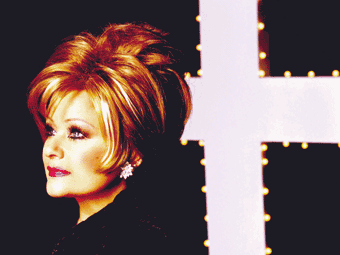THE TRACKS OF MY TEARS
From VH1’s "Behind the Music" to the E! Network’s "True Hollywood Story," portrait docs have attained unprecedented popularity, usually by getting the dirt on the glamorous. Randy Barbato and Fenton Bailey’s The Eyes of Tammy Faye turns this genre inside out, finding a remarkable and compassionate woman beneath the dirt. Peter Bowen looks at this restoration portrait.
Tammy Faye Bakker. Photo by Greg Gorman
Fenton Bailey and Randy Barbato, the dynamic duo behind the production and management company World of Wonder, are renowned for their smart, sensational and often gay-themed reality-based work. From Ru Paul’s first video, Supermodel, to his television special "Ho Ho Ho," from Tickled Pink, a study of gay sitcoms, to Party Monster, a documentary on the New York club-kid murderer Michael Alig that was selected for the 1998 Sundance film festival, World of Wonder’s imprimatur in reality-based television has been fairly clear. As such, their new work, The Eyes of Tammy Faye, a sincere portrait of the first lady of evangelical television would seem to come from out of the blue. But as Barbato stresses, "There is a connection between Tammy Faye and [our] other work – from Porn: The Secret History of Civilization to 101 Rent Boys to Ru Paul," who is coincidentally the narrator of this documentary. "We are attracted by dynamic, interesting people who have been marginalized or misunderstood." But just how misunderstood and mistreated Tammy Faye Bakker Messner has been is what the film explores.
Initially, admits Barbato, their adoration for Tammy Faye was a bit of diva worship. "Both Fenton and I have been obsessed with her forever, especially with the iconicity of her look. Maybe it’s because we’re just a bunch of queens, but we just thought she was fabulous!" And fabulous she is. But not, as the film makes clear, from any kindness that fate dealt her. Weaving Praise the Lord (PTL) footage and news records with current interviews, the filmmakers trace a tortuous trail of disappointments and hardship — from the humiliation of Jim Bakker’s much publicized affair with Jessica Hahn, to her fight with pills, to the highjacking of PTL by Jerry Falwell, to her battle with cancer, to the arrest of her second husband, and the failure of her television career. Despite it all, she perseveres and smiles through her makeup with a philosophy she espoused on one of her failed lifestyle cable shows: "When life hands you lemons, make lemonade!"
Although Tammy Faye’s life was tragic, she was, as the filmmakers were surprised to discover, no sacrificial lamb. For one, "Tammy literally invented the idea of Christian Broadcasting," said Barbato, helping to found in various ways three of the first and most influential Christian Networks (CBN, TBN and PTL). But unlike other tele-evangelists from the Christian Right, who routinely fan the flames of anti-gay hatred, Tammy Faye preached a remarkably compassionate message, inviting people with AIDS on her show early on, and eventually even hosting a talk show with an openly gay man, Jim J. Bullock. The biggest surprise, however, was the Medician treachery of the Christian Right in taking over the Bakker church and fortune. As Barbato and Bailey suggest, "The real scandal is not the fall of the PTL, but the way Tammy and her family were treated as the victims of a witch-hunt. The roll call of shame is embarrassingly long."
What the film continually makes clear is that these discoveries surprised the filmmakers as much as they will the film’s audience. For most people, the mere mention of Tammy Faye conjures up a bad "Saturday Night Live" skit. But the real Tammy Faye is a revelation —— both as an astonishing woman and in exposing our complacency in accepting media stereotypes. As the film suggests, Jerry Falwell could brush-off Tammy Faye’s accusations of deceit and fraud with an insulting quip that "For Tammy, the elevator didn’t go to the top-floor." In truth it does, leaving Falwell and us far below.
VOD CALENDAR


 See the VOD Calendar →
See the VOD Calendar →



